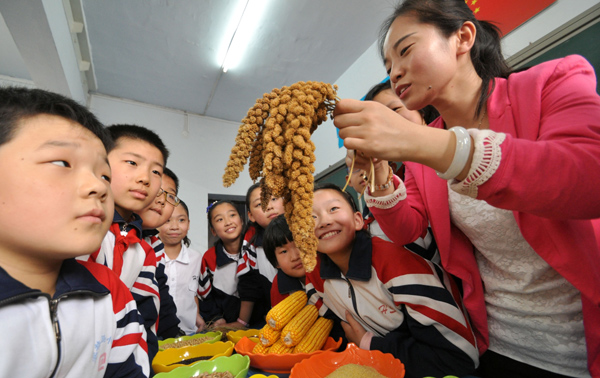Millions of tons of grain wasted yearly
 0 Comment(s)
0 Comment(s) Print
Print E-mail China Daily, October 17, 2014
E-mail China Daily, October 17, 2014
China wastes at least 35 million metric tons of grain every year due to poor storage and transportation methods and excessive processing, an official said.
 |
|
Students at an elementary school in Handan, Hebei province, learn to identify different varieties of grain on Wednesday. The lesson is intended to improve awareness of the importance of not wasting food. Hao Qunying / China Daily |
"The losses can feed 200 million people for a year, which is shameful and needs urgent measures to prevent such waste and loss," said Chen Yuzhong, an official with the State Administration of Grain, adding that the amount wasted during consumption is more shocking.
He said lack of proper storage and transportation methods leads to grain losses of more than 27.5 million tons, and excessive processing causes losses of 7.5 million tons.
According to the State Administration of Grain, in major grain production regions including Liaoning, Jilin, Heilongjiang, Henan, Hebei and Shandong provinces, there are no storage buildings for about 35 million tons of grain.
Of the 210 million farming households across the country, only 3 percent can store grain in a scientific way, according to the Ministry of Agriculture.
"If all of the farmers could store grain properly, 20 million tons of grain would not be wasted," Chen said, adding that, by the end of this year, nearly 8.2 million items of grain-storage tools and equipment will be distributed to farmers in 26 provinces and regions, leading to a saving of nearly 1 million tons of grain.
"In the coming 13th Five Year Plan (2016-2020), building more barns to store grain will continue," Chen said.
Zhao Lijun, deputy director of the Department of International Cooperation of the Ministry of Agriculture, said saving food is China's theme for World Food Day on Thursday, which calls on all sectors of society to take action against food waste.
Wang Lirong, chief engineer of the standards and quality center under the State Administration of Grain, said that besides saving food, grain-processing companies should avoid excessive processing to prevent waste.
"Nowadays, consumers have a higher demand for the appearance of rice in color and shape, but whiter rice doesn't mean more nutrition," Wang said, adding that polishing rice twice or three times results in wastage of rice and energy.
Li Jinyou, head of the Panjin Dingxiang Cereal Co Ltd in Liaoning province, said proper processing helped the company save up to 815 tons of rice and 1.8 million kilowatt-hours of power last year.
"It is a win-win situation for companies and customers," Li said.
Food waste is a severe problem around the world, with about 1.3 billion tons of food lost or wasted every year, which amounts to roughly one-third of all the food produced for human consumption, according to a report released by the United Nations' Food and Agriculture Organization in 2011.






Go to Forum >>0 Comment(s)